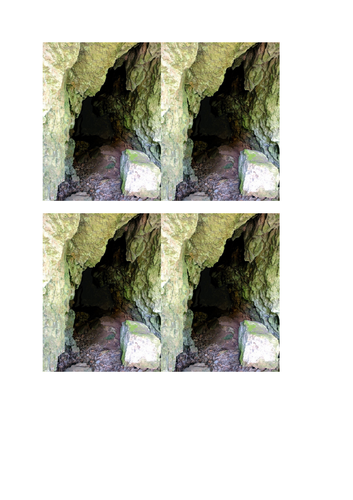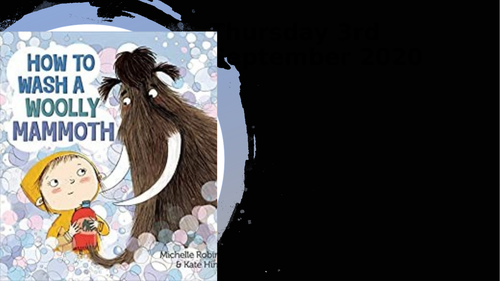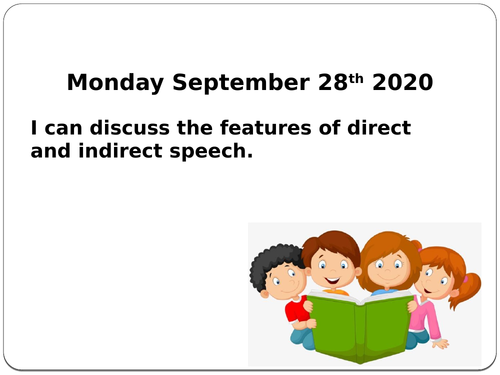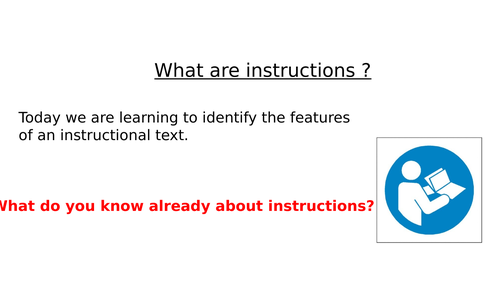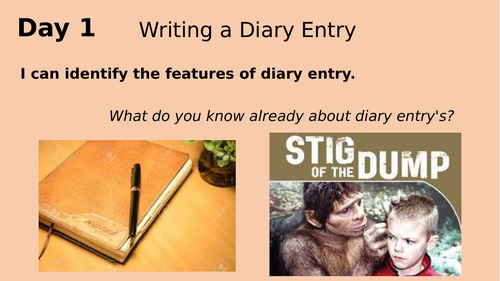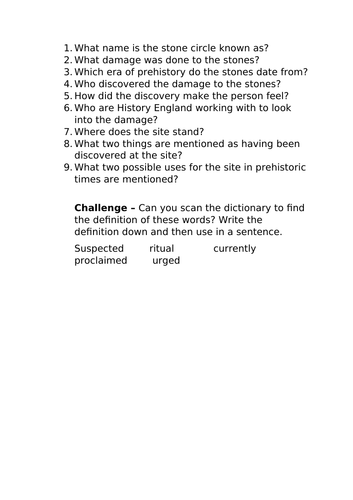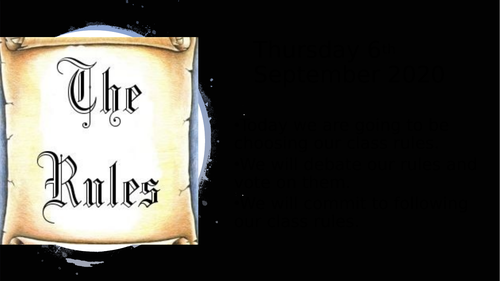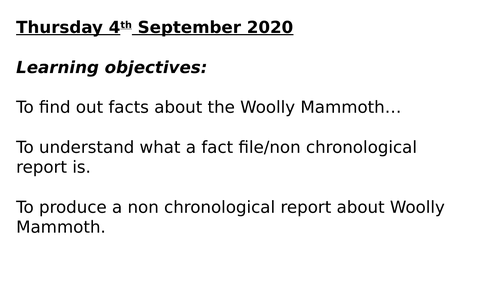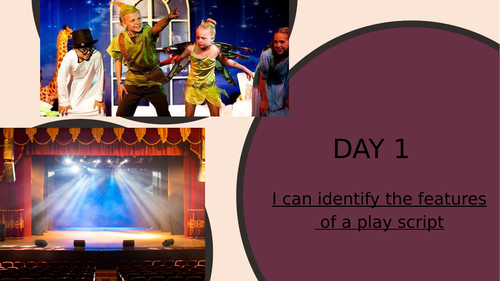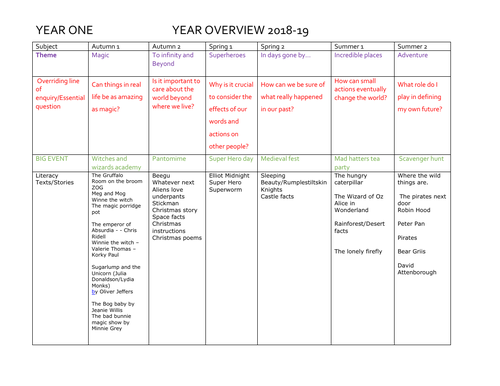13Uploads
7k+Views
3k+Downloads
All resources

Half a term -KS2 Geography plans Y3- Y4- Pre History topic - Stone Bronze Iron age topic
Colourful and attractive slides linked to a half terms work on Geography - linked to a PRE HISTORY - Stone age. Bronze age. Iron age topic.
Covers the following links.
Includes carpet input/whole class teaching session and then follow up table/group/independent activities for children to complete for their books.
Key Stage 2 - Year 3 Year 4 - Mixed Y3/4
Week 1- I can describe the difference between physical and human features in geography.
Week 2- I can recognize that human features appeared in Pre-historic times.
Week 3- I can describe and understand aspects of human geography: types of settlement .I can describe and understand that human settlements appeared in pre-historic times.
Week 4- I can describe and understand aspects of human geography: types of land use. I can describe and understand that human had different uses
for land even in pre-historic times.
Week 5 - I can describe aspects of pre-human geography in a local area.
Week 6 - I can describe and understand aspects of human geography: economic activity including trade links.
Week 7 - I can describe and understand aspects of human geography: including the distribution of natural resources including energy, food, minerals and water.

HOW TO WASH A WOOLLY MAMMOTH - Y1-Y4
Introductory powerpoint to go alongside reading the book and then writing a recount of the story. Includes comprehension questions linked to SAT style questions.
Suitable for Y1-Y4 - Adapt it for your own class needs.

Stig of the Dump - Week of English - Direct Speech + Reading KS2 Y3 Y4 Pre history stone age topic
A weeks worth of English plans for a STIG OF THE DUMP -Pre history - Stone Age, Iron Age, Bronze Age topic
KS2 -Year 3 or Year 4
Day 1- I can discuss the features of direct and indirect speech.
Day 2 - I can understand the difference between direct
and indirect speech.
Day 3 - I can identify main ideas within a text or within a paragraph.
Day 4 -I can identify main ideas from more than one paragraph and summarise these.
Day 5 - I can understand the purpose of the paragraph and how they help to group information.I can understand how paragraphs can organise ideas around a theme and can build up ideas across a text
Good, detailed plans which demonstrate clearly progression from Intent - Implementation and IMPACT as required by OFSTED.
Plans and slides for 5 days of English Lessons. Includes links to KS2 reading standards in the National Curriculum as well as writing .
Sessions of whole class teaching for each day as well as plans and resources for follow up table, independent activities.
Links to STONE AGE, PRE_HISTORY TOPIC
With my other STIG of the DUMP resources and HOW TO WASH A WOOLLY MAMOTH you would have a terms worth of ENGLISH lessons which provide comprehensive cover for Reading, Writing requirements for the National Curriculum for Lower Ks2 Year three Year four

HOW TO WASH A WOOLLY MAMMOTH - KS2 - YEAR 3 / 4 - INSTRUCTIONS, IMPERATIVE VERBS, FRONTED ADVERBIALS
HOW TO WASH A WOOLLY MAMMOTH
A weeks worth of lessons for a Year 3 or Year 4 class. KS2.
55 page powerpoint divided into 5 days worth of teaching/lessons to be used for a whole class /carpet teaching session.
Follow up table activity resources for every session that children can complete independently or in groups for their writing books.
Covers instruction writing - features of instructions.
What are adverbials? What are imperative verbs?
Synonyms
Tasks linked to adverbials and imperative verbs for children to complete at tables in groups or independently after carpet/whole class session.
All tasks and lessons linked to the text “HOW TO WASH A WOOLLY MAMMOTH”
At the end of the week children are equiped to complete writing which will demonstrate that they have the skills to write instructions independently as well as having mastered fronted adverbials and imperative verbs.
Demonstrates Intent/Implementation and Impact.

STIG OF THE DUMP - DIARY ENTRY - KS2 ENGLISH - Y3 Y4 - Week of slides/lessons - Stone age topic
STIG OF THE DUMP - A week of ENGLISH lessons for KS2 - Year 3/Year 4
Perfect for a Stone Age TOPIC
Demonstrates INTENT _ IMPLEMENTATION AND IMPACT
Links to non fiction/ writing a diary entry.
A weeks worth of slides and resources for writing/English books. All sessions include a whole class teaching session input and the activities to follow for children to work independently.
All linked in to STIG of the DUMP
Includes SPAG - see below
Linked to KS2 English objectives of the NATIONAL CURRICULUM
Day 1 - I can identify the features of diary entry. Examining features of a dairy entry plus independent follow up table activities.
Day 2 - I can use noun phrases in my writing. Input for noun phrases and follow on activities
Day 3 - I can infer a characters feelings and emotions.
I can use colloquial language.
Day 4- I can plan a piece of writing -
Day 5 - I can write a diary entry
Input covers
Starts with “Dear Diary”
Uses some personal pronouns: I, we, my, me
Has an introduction to set the scene.
Is written as if talking to someone
Is written in the past tense
Describes the places where the events happened
Talks about feelings, reactions and opinions
Uses time conjunctions to show when things happened
Uses paragraphs to organise the events
Ties in with my other STIG and WOOLLY MAMMOTH resources which together cover a full term of KS2 English and tick of many of the National Curriculum learning objectives for SPAG , Reading and Writing for Y3 and Y4

YEAR ONE Gruffalo/ JULIA DONALDSON Activinspire flipchart
Weekly flip chart to support a week of Y1 English lessons using The Gruffalo.
Simple activities to reinforce Capital letter, full stop, finger spaces when writing sentences.
Activities linked to using ADJECTIVES.
A page linked to describing settings and a page to complete a whole class character study.
Rewrite the end of a Julia Donaldson story.
Easy to use flipchart which can be adapted to suit your own teaching needs.

STIG OF THE DUMP- NEWSPAPER REPORTS KS2-Y3 -Y4-ENGLISH PLANS- -STONE AGE-PRE HISTORY SCHEME OF WORK
A weeks worth of English plans to link to a PRE-HISTORY- STONE AGE topic - KS2 - Year 3 Year 4
Linked to newspaper reports - The scheme of work includes a week of ENGLISH plans - 5 days of teaching input for the whole class and plans for follow up independent, table activities for writing books etc. All slides included as well as other resources needed. Covers National Curriculm requirements.
Day 1 - I can identify the features of a Newspaper report.
Day 2- I can locate information when directed using skimming and scanning in non-fiction. I can retrieve and record information from non-fiction.
Day 3- I can plan a newspaper report that
includes the common features.
Day 4- I can write a newspaper report.
Day 5- I can re-read writing to check for meaning and tense form.
I can make appropriate additions, revisions and corrections when proofreading and editing

Class rules for New Class -(Includes COVID SAFETY) and ties to BRITISH VALUES
Simple and Attractive powerpoint to introduce classroom rules to your new class in September (or later in the year if needed).
Links to BRITISH VALUES and democracy/voting. Good cross curriculuar PSHE tie in. Good way to discuss staying COVID safe. Timesaving and ready made resource which will fit into any classroom.

WOOLY MAMMOTHS FACTUAL POWERPOINT _ STONE AGE TOPIC
Lovely Non Fiction Powerpoint to use with your STONE AGE topic. Focus on WOOLLY MAMMOTHS. Cam be used to create a FACT FILE or NON CHRONOLOGICAL REPORT. Also links well to the test HOW TO WASH A WOOLLY MAMMOTH.

NON FICTION MAGIC - FACTS ABOUT BRITISH MAGICIANS - ACTIV INSPIRE
I used this flip chart when teaching a MAGIC topic in KS1 for the NON Fiction section of the topic. My class LOVED it.
Flip chart to support a week of work for a MAGIC topic - suitable for Reception to Y2. Originally created for a Y1 class.
Links to magic tricks to watch online.
Good background information about magicians Paul Daniels and Dynamo. Differences between conjurers and wizards.
Leads on to writing fact files/non chronological reports.
I can…
Discuss the difference between fiction and non fiction.
Recall some non fiction facts and discuss them.
Scribe a sentence.
WALT… what is non fiction?
Use capital letters and finger spaces when writing a sentence.
Use interesting adjectives
Session 1 – What is a magician? The difference between real life and fiction magicians.
Read the first section about magicians and what they do. Talk in partners to recap what we read. As a class, recall what we have discussed. Shared write a few sentences.
Table Activity: - Write a sentence about some of the facts we have learnt about magicians.
Session 2 – Who was Paul Daniels?
Readsome facts about Paul and his life. Watch some clips of his magic Talk in partners to recap . As a class, recall what we have discussed. Shared write a few sentences.
Table Activity: - Write about Paul Daniels.
Session 3 - DYNAMO
Capital letter
Full stop
Finger spaces
Character
Setting
Author
SPAG starter
Orally rehearse a sentence.

STIG OF THE DUMP KS2 - COMPREHENSION WEEKS WORTH OF READING PLANS AND ACTIVITIES
Stig of the Dump - A week of plans linked to the start of the book - tied to READING and COMPREHENSION requirements of the NATIONAL CURRICULUM. Ideal for a Year 3 or Year 4 class.
A weeks worth of slides included in the power point tie into the book.
DAY 1 - I can make plausible predictions.I can predict what might happen from details in the text.
DAY 2 - I can discuss words and phrases that capture the readers interest and imagination . I can talk about how descriptive language and small details are used to build an impression of an unfamiliar place.
DAY 3 - I can infer from a text
DAY 4 - I can explain the meaning of words in context.
DAY 5 - I can use a dictionary
The weeks worth of lessons includes a whole class input followed by independent/table activities.
The lessons EXPLICITIY teach comprehension skills. and also cover the following requirements of the KS2 Year 3 and Year 4 English curriculum:
• listening to and discussing a wide range of fiction, poetry, plays, non-fiction and reference books or textbooks
• reading books that are structured in different ways and reading for a range of purposes
• using dictionaries to check the meaning of words that they have read
• increasing their familiarity with a wide range of books, including fairy stories, myths and legends, and retelling some of these orally
• checking that the text makes sense to them, discussing their understanding and explaining the meaning of words in context
• asking questions to improve their understanding of a text
• drawing inferences such as inferring characters’ feelings, thoughts and motives from their actions, and justifying inferences with evidence
• predicting what might happen from details stated and implied
• identifying main ideas drawn from more than one
paragraph and summarising these
• identifying how language, structure, and presentation contribute to meaning
• retrieve and record information from non-fiction
• participate in discussion about both books that are read to them and those they can read for themselves, taking turns and listening to what others say.

STIG OF THE DUMP PLAY SCRIPTS - WEEK OF ENGLISH YEAR 3 YEAR 4 KS2 STONE AGE TOPIC PRE HISTORY
Ties in with my other STIG and WOOLLY MAMMOTH resources which together cover a full term of KS2 English and tick of many of the National Curriculum learning objectives for SPAG , Reading and Writing for Y3 and Y4.
Demonstrates Intent/Implementation and Impact.
DAY 1 - I can identify the features
of a play script
DAY 2 - I can write a play scene
DAY 3 - I can use possessive apostrophes
DAY 4- I can create settings,
characters and plot.
DAY 5 - I can prepare a playscript to read aloud. I can read aloud my own writing using appropriate intonation

YEAR ONE LONG TERM PLAN
Long term plan for Year One.
Includes Topics for all six terms - lists ideas for texts for each topics. Also includes ideas for a “BIG EVENT” to create that links in with the topic. Also includes an “Overriding line of enquiry/Essential question” to explore with your class. Imaginative and exciting outline of three terms of work for your Y1 class. Includes ideas for art, geography, history and science.
Maths - not included!

